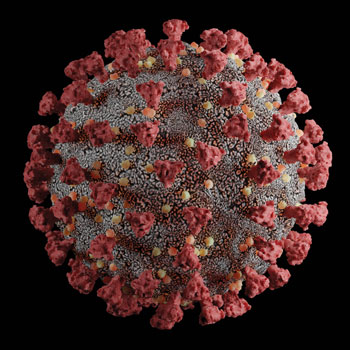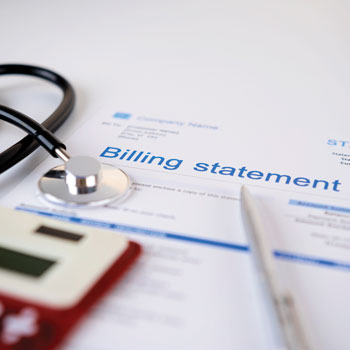Experts cover common COVID-19 challenges
A recent ACP/Annals of Internal Medicine forum on COVID-19 considered the timing of vaccination, outpatient treatment, and pre-exposure prophylaxis.
The patient cases discussed during the latest ACP and Annals of Internal Medicine COVID-19 forum were hypothetical, but they raised questions that many internal medicine physicians have likely already faced.
Vaccination, outpatient treatment, and pre-exposure prophylaxis were all on the table when experts gathered virtually for the 10th forum, held on Sept. 7 and titled “Current Clinical Challenges in COVID-19 Prevention and Management.” A recording of the forum and accompanying commentary were published by Annals on Sept. 9.

During the forum, both attendees and panelists voted for responses to three COVID-19-related clinical vignettes. George M. Abraham, MD, MPH, MACP, ACP's Immediate Past President, moderated discussion of these questions and additional ones submitted by clinicians either in advance or during the session.
Panelist Sabrina A. Assoumou, MD, MPH, presented the first vignette: a patient who was vaccinated with two doses of an mRNA vaccine, received a booster dose in December 2021, and then was infected with COVID-19 in July. “How would you advise this patient?” asked Dr. Assoumou, who is an assistant professor of medicine and the inaugural Louis W. Sullivan, MD, Professor of Medicine at Boston University School of Medicine.
Most attendees, and all of the experts, voted that the patient should get boosted with one of the updated mRNA vaccines, which were authorized by the FDA and recommended by the CDC less than a week before the forum.
The more uncertain issue is timing that shot, noted panelist Carlos del Rio, MD, FACP, executive associate dean and distinguished professor in the department of medicine, division of infectious diseases at Emory University School of Medicine in Atlanta.
“I would talk to her about the timing of her vaccine. She doesn't need to rush to get a vaccine at this point in time,” he said. “Given the fact that she tested positive in July, she can easily wait until October or November.”
Evidence indicates that getting the vaccine too soon after infection could make it less effective, noted Dr. Assoumou. “The CDC actually recommends that you vaccinate a person approximately three months after infection. That's based on a study that looked at patients who were infected and then vaccinated later, and it looked like they actually had a higher level of protection compared to people who were vaccinated sooner,” she said.
Dr. Assoumou also cited data from a study, available as a preprint, that has Anthony S. Fauci, MD, as a coauthor. “What they found is that if the interval between infection and boosting is too short, then that could actually limit the B-cell responses to the booster,” she said. “So my recommendation would be that we want to have a sufficient interval. … Wait approximately three months from infection.”
Panelist Camille N. Kotton, MD, agreed but added that she's less sure about delaying boosters after infection in the patients she typically treats as clinical director of transplant and immunocompromised host infectious diseases at Massachusetts General Hospital in Boston.
“For immunocompromised patients, we don't know as much about that three-month delay, and I'm always a little nervous. … I do worry that they might not be well protected in the interim, but we don't really have information regarding boosters in that setting,” said Dr. Kotton, who is also an associate professor at Harvard Medical School.
An immunocompromised patient was the focus of another vignette during the forum, which asked panelists and attendees to advise a patient with severe rheumatoid arthritis treated with disease-modifying therapy who is worried about her risk of a poor outcome if she catches COVID-19.
The agreed-upon answer was that this patient should have both up-to-date vaccination and pre-exposure prophylaxis with long-acting monoclonal antibodies (Evusheld), although not at the same time.
“The one thing to not do is to give Evusheld within two weeks of receiving the vaccine. Usually it's recommended that people get the vaccine, wait two weeks, and then get Evusheld,” said Dr. Kotton.
Relatively few of those to whom this applies have followed that plan, she added. “Less than 5% of immunocompromised Americans have had a dose of Evusheld, so it's really, really underused.” An injection lasts six months, and the FDA recently recommended an additional dose six months later, said Dr. Kotton, who described this as “the belt-and-suspenders approach” for patients who may not have a strong antibody response to vaccination.
Dr. del Rio agreed. “The supply far exceeds the demand out there. I would like to encourage people who have immunocompromised patients to really think about using Evusheld in addition to vaccination,” he said.
Clinicians and patients can use the federal government's therapeutics map to find out where the antibody treatment is available, Dr. Kotton noted.
The map also shows availability of nirmatrelvir-ritonavir (Paxlovid), and that therapy was another focus of conversation. The relevant vignette described a patient who had COVID-19 and didn't need antiviral therapy because he didn't have any risk factors, but it led the experts to discuss when the drug should be used.
“There's been so much press recently about the ‘rebound’ which might occur after treatment with Paxlovid. Your thoughts about balancing the potential benefits of Paxlovid versus the chance of a rebound?” asked Dr. Abraham, who is a professor of medicine at the University of Massachusetts Medical School in Worcester.
“I like calling it ‘COVID rebound’ [rather than ‘Paxlovid rebound’], because even people that don't get treatment can have a rebound,” said Dr. del Rio. “You can have biological rebound, you can have clinical rebound, and you can have both biologic and clinical rebound.”
It's uncertain how often this rebound occurs, with or without antiviral treatment, he noted. “In the clinical trials [of nirmatrelvir-ritonavir], it's about 2%,” Dr. del Rio said. “If you look at Twitter, you would think it's 100%.”
It's important to remember that COVID-19 rebound does not increase morbidity or mortality, the experts agreed. “Even if you're over the age of 65 and you get a rebound, there's no risk. We have famous people that have rebounded. We have the president of the United States, we have Dr. Fauci,” said Dr. del Rio, who noted that although both of those famous patients underwent a second round of nirmatrelvir-ritonavir treatment, he would not typically recommend that.
“The recommendation would be not to treat somebody but to explain it,” Dr. del Rio said. “I think the biggest issue with the rebound is the frustration you get.”
Dr. Assoumou reminded patients and clinicians to focus on the positive. “If you get rebound and you're isolated in your house, and you don't have to go to the ICU or to the hospital, that's a win,” she said. “I know it's a nuisance … but thinking about in the grand scheme of things, if you qualify for it, and the medication was able to prevent you from needing to go to the hospital, that's actually a good thing.”
The conversation turned to whether nirmatrelvir-ritonavir is such a good thing that patients should have prescriptions on hand in case they catch COVID-19. “That is not currently approved,” said Dr. Kotton. “Also, if we did that, many of us could qualify for Paxlovid. We don't have enough doses so that everyone can have it at home in their cabinet like we do Tylenol or something like that.”
Another concern is the many possible drug interactions with nirmatrelvir-ritonavir. “Many people are asking for it for travel or other reasons. But I really worry that if someone had a horrible drug-drug interaction in a foreign country, they might actually become even sicker,” Dr. Kotton said.
Worrying about COVID-19 symptoms ruining a vacation is a huge leap forward from where the world was in spring 2020, the experts agreed. They are bothered by how many patients still aren't covered by all of the available protections, though.
“The work that needs to be done is still people who are not yet vaccinated. I think we should all focus our efforts there,” said Dr. Kotton.
Don't forget about the ones who got their initial vaccinations but haven't gotten another shot, added Dr. del Rio. “There's a significant percent of the population in our country, people over the age of 50, especially people over the age of 65, that have not even received their first booster,” he said. “We need to really emphasize that having to have that booster is part of your initial vaccination series. … Those individuals are still at pretty high risk of significant disease, and those are the ones we're still seeing in the wards or occasionally even in the ICU.”




